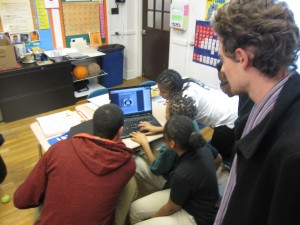Discover The Universe
Dec 5th, 2012 by vasila
Discover the Universe is a website designed for students to perform self-guided research on any topic of their choosing. This technology is entirely software based, and accessible to anyone with a computer and access to the internet. A working prototype can be viewed here:
http://www.continuouscompost.com/imageboard/
Discover the Universe was developed by William Dorgan and Adam Vasilakis. We used Kusaba X as a framework for our prototype, which is coded using PHP and MySQL.
How it works
Discover the Universe consists of two different imageboards. The first, which can be seen on the left tab entitled “Discover the Universe”, has a series of interesting pictures from a variety of topics such as astronomy, biology, arts, physics, history or even fashion. These pictures are each accompanied with a few key words in order to point the student in the right direction.
After selecting an image, the students can click on a button at the top of the page which takes them to a kid-friendly search engine called “KidRex”. This search engine not only blocks any offensive content but also gives higher search priority for websites and articles aimed at children.
After performing adequate research, students can click on the second left tab entitled “Current Discoveries”. This will bring them to a board where they can view all of the current ongoing research projects, or “Discoveries”, and they can post their own using the reply function on the website. At the top of this board is a template that students can fill out when they post their Discovery.
Learning Objectives
There are two distinct learning outcomes from this product. The first outcome is to teach students how to perform research online about a given topic. Performing research is a crucial academic skill and there is a strong need for a software that can allow kids to learn how to look up topics, learn about them, and post results in a way that is safe and free of distractions.
The second outcome of this project is to allow kids to follow their passion and research topics that they find genuinely interesting. This approach is very similar to the idea of Democratic Education. This method of education breaks down learning into three different parts: Community inquiry, Inquiry-based learning and Technology-enhanced learning.
source: http://chipbruce.wordpress.com/research/
Our product, Discover the Universe, is specifically focused on inquiry-based learning, where students are expected to use their innate curiosity and inquisitiveness in order to learn. We expect that students will not only be more interested in doing research, but also genuinely enjoy it.
Relevance to curriculum
Discover the universe will be an effective way of learning in a classroom environment due to the fact that teacher may post lesson plans to the image board for their students, and they know that it is a safe way for kids to explore, learn and research. The students then may post their answers, projects, questions or whatever it may be into the web page. The professor will then know who posted what and may easily collect and assess what their students are doing. Not only is it a safe way to learn online, but it will also help kids learn necessary skills for later in their lives. Less privileged kids may have a hard time interacting with technology and navigating in the world of today, which is technology laden everywhere you go. Any kid who has access to a computer at home, in a library, or simply has access to the Internet on a multitude of other devices has access to our product. Learning the basic computer and research skills will not only benefit them in their school studies, but will assist them later in life wherever it may take them.
During our final field trip to the Ark Community Charter School, we interviewed one of the 6th grade teachers so that we could get his opinion of our product and understand the teacher’s role in our product. The teacher expressed a great deal of interest in our product and was delighted to see how similar this method was to standard academic research. He was pleased that the software added some structure and helped keep students focused whilst they did their research. When asked about his role in this technology, he stated that he could definitely incorporate this into a lesson plan. If he was given administrative privileges over the website, he could give students specific instructions and even grade their work. If this product was to be fully developed and proven to be secure, he claimed that he would be very interested in using it in his classroom.
Future Iterations
In the future, we would like to try to make our product more usable and learner friendly than it currently is. We would implement the use of computer programmers and web design employees to help us in this task. Also, we would have these employees help make this an extremely safe and secure website, where the kids wouldn’t be able to go off and explore the open web no matter what. Or we could contact KidRex and see if they would be interested in co-creating this program with us to help them and us gain more of an online community/presence.
Another option would be to make it a computer program that accesses the Internet for learning and posting purposes so that Internet tangents may be avoided. We could also implement different categories for different age ranges or different school districts. We would talk to schools to gain interest and see who would be interested in implementing our technology in their learning objectives. Our last thought would be whether to open source this or make it a marketable product for home or school use. Currently this isn’t as important to us as is creating a community of users for our product. The more mass appeal and online users the better, so the word can be spread.

